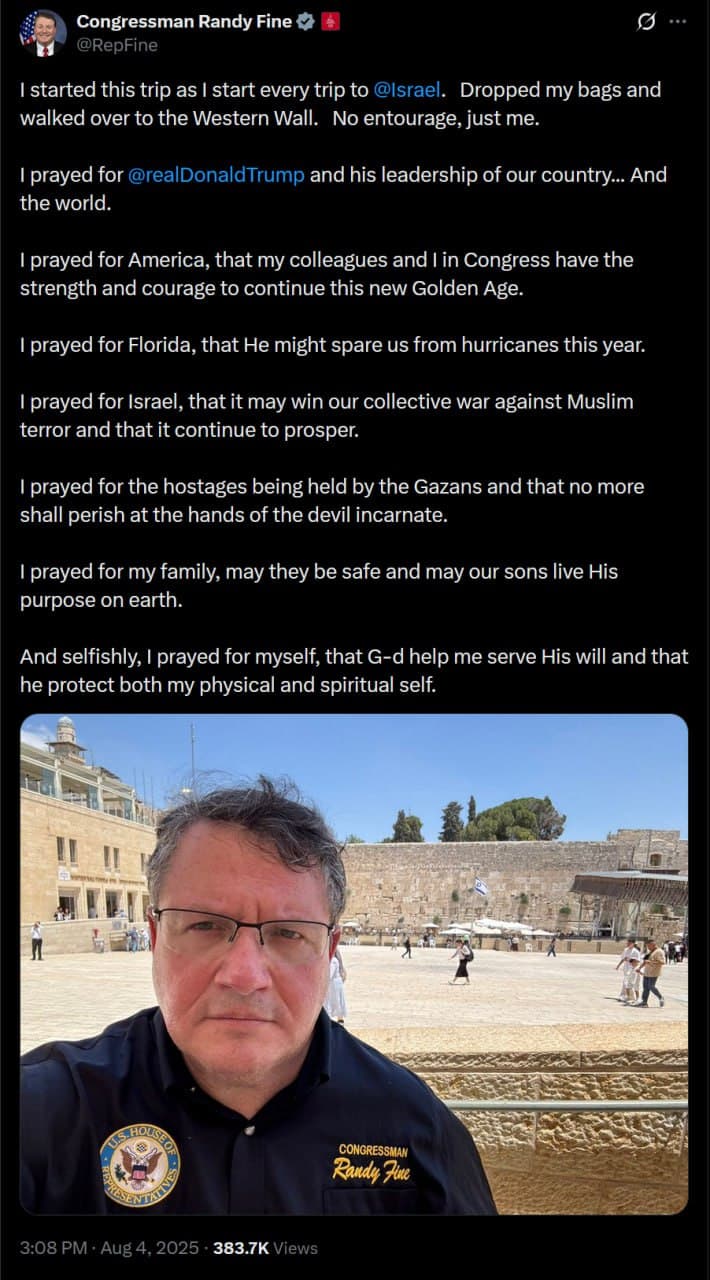Congressman Randy Fine Faces Backlash After Gaza Remarks, Visits Wailing Wall
U.S. Congressman Randy Fine, known for his controversial stance on the Gaza conflict, has recently ignited a firestorm of criticism following his calls to impose severe restrictions on the population of Gaza. The backlash has prompted Fine to travel to Jerusalem, where he visited the iconic Wailing Wall to pray, ostensibly seeking solace amid the controversy. His remarks, which many have interpreted as advocating for the starvation of civilians, have led to his expulsion from the American Israel Public Affairs Committee (AIPAC), a significant player in pro-Israel lobbying.
Background & Context
The ongoing conflict between Israel and Hamas has been a focal point of international attention, particularly as tensions have escalated in recent months. Fine"s comments came against the backdrop of a humanitarian crisis in Gaza, where residents face dire conditions due to the blockade and ongoing military operations. His statements were met with immediate backlash from various quarters, including fellow lawmakers and humanitarian organizations, who argue that such rhetoric exacerbates the suffering of innocent civilians caught in the crossfire.
AIPAC"s decision to sever ties with Fine underscores the complex dynamics within American political support for Israel, where voices advocating for humanitarian considerations are increasingly prominent. The organization, which has historically championed strong U.S.-Israel relations, has faced scrutiny for its response to the humanitarian situation in Gaza, leading to a reevaluation of its stance and affiliations.
Key Developments
Fine"s remarks, which he made during a recent press conference, called for measures that critics argue would lead to widespread suffering among Gaza"s civilian population. "We need to make them feel the consequences of their actions," Fine stated, referring to Hamas"s ongoing hostilities. His comments were immediately condemned by various advocacy groups, including Human Rights Watch and the American Civil Liberties Union, which emphasized the need to protect civilians in conflict zones.
Following the backlash, AIPAC"s decision to drop Fine was swift and decisive, highlighting a growing divide within the pro-Israel community regarding the approach to the Gaza conflict. The organization released a statement emphasizing its commitment to humanitarian principles, stating, "We stand firmly against any rhetoric that calls for the suffering of innocents." Fine"s visit to the Wailing Wall appears to be a personal attempt to seek redemption and reaffirm his support for Israel in a time of crisis.
Broader Impact
The fallout from Fine"s remarks and subsequent actions has sparked a broader conversation about the moral responsibilities of politicians in foreign conflict situations. Experts argue that inflammatory rhetoric can have real-world consequences, potentially inciting violence and further complicating peace efforts. "When leaders speak in such absolute terms, they risk alienating not just their constituents, but also international allies who prioritize humanitarian concerns," noted Dr. Sarah Goldman, a political analyst specializing in Middle Eastern affairs.
This situation mirrors similar instances in the past where political figures faced backlash for their comments on sensitive issues. The recent discussions between Russian President Vladimir Putin and Israeli Prime Minister Benjamin Netanyahu regarding security in the region highlight the delicate balance of diplomatic relations amid such controversies. As previously reported, recent developments indicate that global leaders are increasingly cautious about the rhetoric used in discussions surrounding Israel and Palestine.
What"s Next
Moving forward, the implications of Fine"s remarks will likely reverberate through the political landscape as the 2024 elections approach. With many Democratic leaders reassessing their positions to maintain a pro-Israel stance while addressing humanitarian concerns, Fine"s comments may become a focal point in upcoming debates. The potential for division within both parties regarding U.S. policy towards Israel and Palestine is palpable, as lawmakers navigate a complex web of domestic and international pressures.
As the situation in Gaza continues to evolve, the repercussions of Fine"s actions will be closely monitored by both supporters and opponents. Further developments are expected in the coming weeks, particularly as the Israeli Defense Forces (IDF) target key objectives in Gaza, as outlined in earlier reports about Netanyahu"s plans to convene a security cabinet. The ongoing discourse surrounding humanitarian responsibilities and political rhetoric will undoubtedly shape future discussions on U.S. foreign policy in the region.



![[Video] Gunfire between Iraqi security forces and Sadr militias in Baghdad](/_next/image?url=%2Fapi%2Fimage%2Fthumbnails%2Fthumbnail-1768343508874-4redb-thumbnail.jpg&w=3840&q=75)
